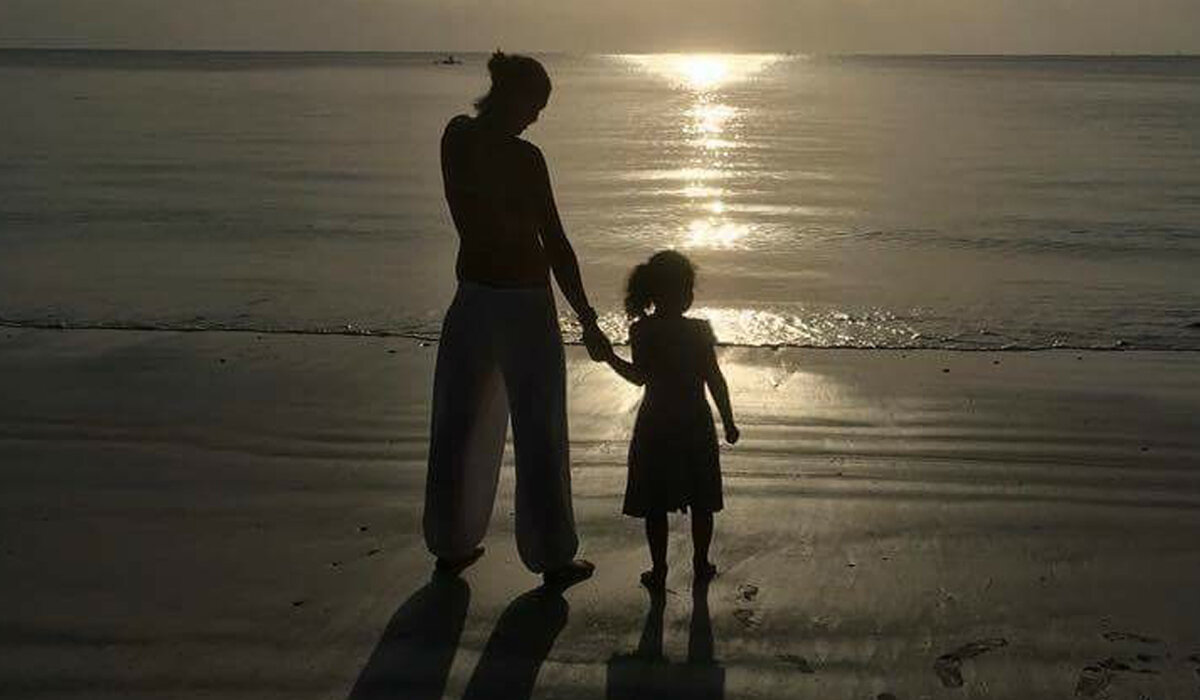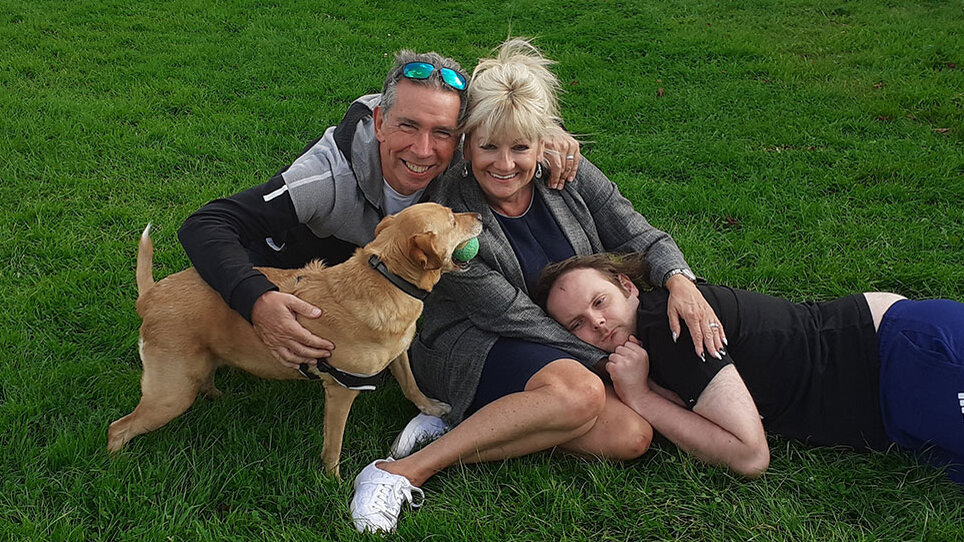
"Rarely an hour goes by that I don't think about what happened in hospital."
Alexis Quinn
- on her experience of being in a mental health hospital
Stories from the Spectrum: Alexis Quinn
Autistic woman and author of the memoir Unbroken, Alexis Quinn, spent three years “locked inside” various mental health hospitals, including Assessment and Treatment Units (ATU).
An ATU is a type of mental health hospital often used as emergency care for people who are experiencing mental health problems. ATUs are supposed to offer a short term stay in a safe environment while someone’s mental health needs are assessed and then treated but many autistic people end up being detained in them under the Mental Health Act and are unable to leave. Autistic people who enter an ATU for mental health support may receive treatment that does not reflect their needs because their autism is not understood or find that the environment is inappropriate. This can make an autistic person feel worse instead of better, and means they can stay ‘trapped’ inside an ATU for years, which is unacceptable.
The National Autistic Society is campaigning to redefine the Mental Health Act, so that it is no longer classified as a ‘mental disorder’. This will help autistic people receive help that works for them and avoid detention inside ATUs or inpatient mental health hospitals.
It is important that we publish Alexis’ interview in full, to highlight why these experiences inside mental health hospitals can go on for so long with such traumatic results and what mental health services must do to create a society that works for autistic people…
What happened prior to going into an ATU?
I received my autism diagnosis while I was an inpatient in a mental health hospital. I had previously been wrongly diagnosed with six other diagnoses. These wrong diagnoses meant that I received treatment that wasn’t suited to me. I got worse instead of better.
When I was finally diagnosed as autistic, my treatment and therefore my life improved considerably as staff began to understand my reactions to things. In 2012, my daughter was born. Major life events are difficult for anybody to manage and changes to lifestyle and routine can unsettle even the most resilient people. I moved from where I was living in Asia back to the UK. Later that year, my brother died suddenly. These events created a permanent state of ‘overload’ and I became very sensitive. Everyday activities like organising myself to have a bath and get dressed became impossible. The supermarket was a ‘no go’ area as I find supermarkets cluttered and overwhelming. Shortly after I confided my difficulties to a doctor, services became involved. The lack of understanding from medical professionals around my difficulties added more stress and compounded the issues I was having. At this point, I voluntarily sought mental health support inside an ATU and was later detained there under the Mental Health Act, so I couldn’t leave.
Did you get any support before your admission?
Support before my admission into an ATU was almost non-existent. The nature of the support, which was random, unscheduled visit from the crisis team, added to the stress.
Medication was thrust upon me, causing severe and scary side effects. In total I was taking up to 14 tablets a day including benzodiazepines, antipsychotics (I was never psychotic), Concerta (for ADHD) and promethazine. I take no tablets now and haven’t since the day I escaped and fled the country. I felt as though I was in a permanent state of threat. With my anxiety at an all-time high, I seemed to become everything that the mental health professionals were saying I was.
What would have helped stop you going into an ATU?
I needed someone to not judge my reactions to things and for someone to realise that I had lost my structure and routine. I needed someone to help me create a new structure and assist me in seeing my new reality: a life without my brother and a life with my daughter. I was not mentally ill, I was an autistic adult reacting to difficult events that had happened in my life, but I was treated like the way I was reacting was ‘wrong’. I needed safe ways to modulate my sensory system and for professionals working with me to understand what sensory overload can feel like for an autistic person. I needed people to care and tell me that I wasn’t sick and faulty and wrong and that I would regain order and structure in my life. I needed hope and understanding. Practically, I needed an Occupational, Speech and Language therapist and a psychologist.
Did the staff in the ATU understand autism?
The turnover of staff in the ATU was so high that it was difficult to sustain any meaningful therapeutic relationships. It also meant that staff were not properly trained. This created a dangerous culture, sadly lacking true care. Staff seemed to be constantly treading water. Well organised, genuine help was as rare as a solar eclipse.
Poorly trained staff reacted to overloads and meltdowns in a physical way. I faced a daily cycle of inappropriate care, sensory overloads which turned into meltdowns, overmedication and concurrent use of multiple medications, restraint and sometimes seclusion.
Of course staff do not set out to do a bad job and many staff worked earnestly. But this is no consolation to those of us who have suffered. As C.S. Lewis wrote: "Of all tyrannies, a tyranny sincerely exercised for the good of its victims may be the most oppressive."
For many of us, locked away inside the ATU, this phrase felt true.
Did the staff at the ATU understand how women and girls experience autism differently to boys and men on the spectrum?
I believe the staff in the ATU had a general lack of understanding of autism full stop. People who were ‘on the ground’ daily and who spent the most time with autistic people were those with the least training. The greatest issue was staff understanding the difference between my strong capabilities in verbal language and my very limited ability to understand the words and language that other people were using. The result was a complete breakdown in communication where I would end up in overload and then meltdown.
I just couldn’t explain to the staff how to break the cycle because they didn’t understand autism. If the staff had a better understanding of autism, then so many emergency situations could have been avoided.
How long were you in the ATU?
I was in an ATU for almost six months. I was detained under the Mental Health Act and remained so for most of my stay. The Mental Health Act is a piece of legislation which provides a legal framework to detain people when they are mentally ill and require treatment to get better. The interesting thing about a treatment order for an autistic person is that autism is not a mental health condition. Whilst mental illness, such as depression and anxiety, can be treated, for autistic people this has to be in a way that reflects their needs and understands autism. When I was detained under the Mental Health Act I felt like this was because of behaviour relating to my autism, not because I was mentally ill; the whole process lacked any understanding of the difference between autism and mental illness.
Why were you in the ATU for much longer than the intended stay?
The hospital setting is never going to be a place where autistic people can flourish. Autistic people need a familiar, structured environment where their sensory systems are at ease and where they feel in control. Hospitals provide unfamiliar boundaries, locked doors and environments which are at best routine-less and at worst chaotic and detrimental. Professionals can never help an autistic person manage themselves in an environment which is constantly changing and where a person can never gain control and autonomy. Autistic people need to learn to manage the environment in which they will be living. Appropriate routine and structure needs to be explored and set up which suits the individual person.
What do you think needs to change to keep autistic people out of ATUs?
Care and Treatment Reviews (CTRs) must be a lawful entitlement and not simply ‘good practice’. CTRs are meetings between relevant professionals, a peer and the autistic person that can help improve future care and can include plans for leaving the hospital. The idea is to keep autistic people out of hospital who do not need to be there. Clearly, I didn’t need to be in hospital, held under the Mental Health Act. I had told everyone that would listen – including the commissioners. I never had a CTR. I asked for one repeatedly, yet I was told they are not mandatory and are simply ‘good practice’.
I was forced to take the step of escaping. I couldn’t tolerate my life behind locked doors anymore. As soon as I set myself free I flourished. Autistic people need homes, not hospitals.
If I hadn’t have escaped, my ‘service’ would have been escalated to forensic level and I would still be detained. I am lucky.
I recommend that a CTR must be enforceable by law, this would be a positive start to keeping autistic people out of ATUS. I also feel like community care is not only cheaper but more effective, and also has the added benefit of not traumatising the autistic person. My care must have cost over two million pounds. In reality all I needed was about £2,400 of occupational therapy, psychology and speech and language therapy.
How did you leave the ATU?
After further placements within the mental health system, it became clear that to get better, I had to stop being an inpatient. With the help of a retired GP and a teacher, I escaped by running to their car, travelling to Dover and boarding a ferry for France. The staff at the rehabilitation looked on as we drove away, and I knew that they would try to follow me.
I made my way to Paris Charles-de-Gaulle airport. I boarded a plane for Dubai and then transited to Lagos in Nigeria.
I landed in Lagos two days after my escape. Within six weeks of building the right environment for me to thrive in, I had secured full time work in a school.
Each step was challenging and mental health services, police and the Home Office went to great lengths to keep me detained in the UK.
I shouldn’t have felt like I had to do this. The system needs to be changed to be more supportive to autistic people experiencing mental health problems.
What impact has having been in an inpatient unit had on you?
Rarely an hour goes by that I don’t think about what happened in hospital. Each day and night I get flashbacks, startle when I see uniformed staff, police cars and sirens.
I avidly avoid anything that reminds me of my time in wards. This includes little things like sets of keys. All my keys for my classrooms at school are on separate key chains because I cannot tolerate the sound of keys jingling.
There were social challenges to do with ease of returning to work as a teacher and I still have a diminished sense of self in terms of my family and community. I have always been a respected member of both, yet for a while I was cast as the “crazy autistic person.” The damage to myself and my relationships are profound and irreparable.
The experience of being locked inside an ATU has had an ongoing, traumatic psychological impact. Over medication, restraint and seclusion are not something I will forget easily. Degraded, I realised I had little control of anything. Even my thoughts were not as free as the potent culture of submission that invades every encounter, every thought and feeling. Losing the right to live freely and being subject to 24 hour a day scrutiny is something I’ll never, ever forget.
And the most worrying part is that it could happen again.
"Rarely an hour goes by that I don’t think about what happened in hospital. Each day and night I get flashbacks, startle when I see uniformed staff, police cars and sirens."

What can mental health services do to create a society that works for autistic people?
Staff need to be properly trained to help and care for autistic people. I am not talking about one day of training, I am talking about meaningful learning which is assessed in a practical way over a long period of time. Any mental health services which are delivering care to autistic people need to ensure that they are fit for purpose to deliver care to autistic people. I am afraid that the current system is discriminatory.
Support Alexis’ petition to end the abuse of autistic people and people with a learning disability in inpatient units.
Unbroken: Learning to Live Beyond Diagnosis was published in 2018. It is available in paperback (Trigger Publishing, £11.99).
Campaign with us
Find out more about our latest campaigns, what our work involves, and how you can help transform the lives of autistic people.

Similar stories

"Our aim was to get Ryan and other autistic people out of hospitals and into the community."
Sharon Clarke
- on mental health hospitals and advocating for her son, Ryan
Read more
Get advice and support

The Spectrum magazine
Explore one of the UK's largest collections of autistic art, poetry, and prose. The Spectrum magazine is created by and for autistic people, and is available both online and in print.
Read the Spectrum





You are not alone
Join the community
Our online community is a place for autistic people and their families to meet like-minded people and share their experiences.
Join today

